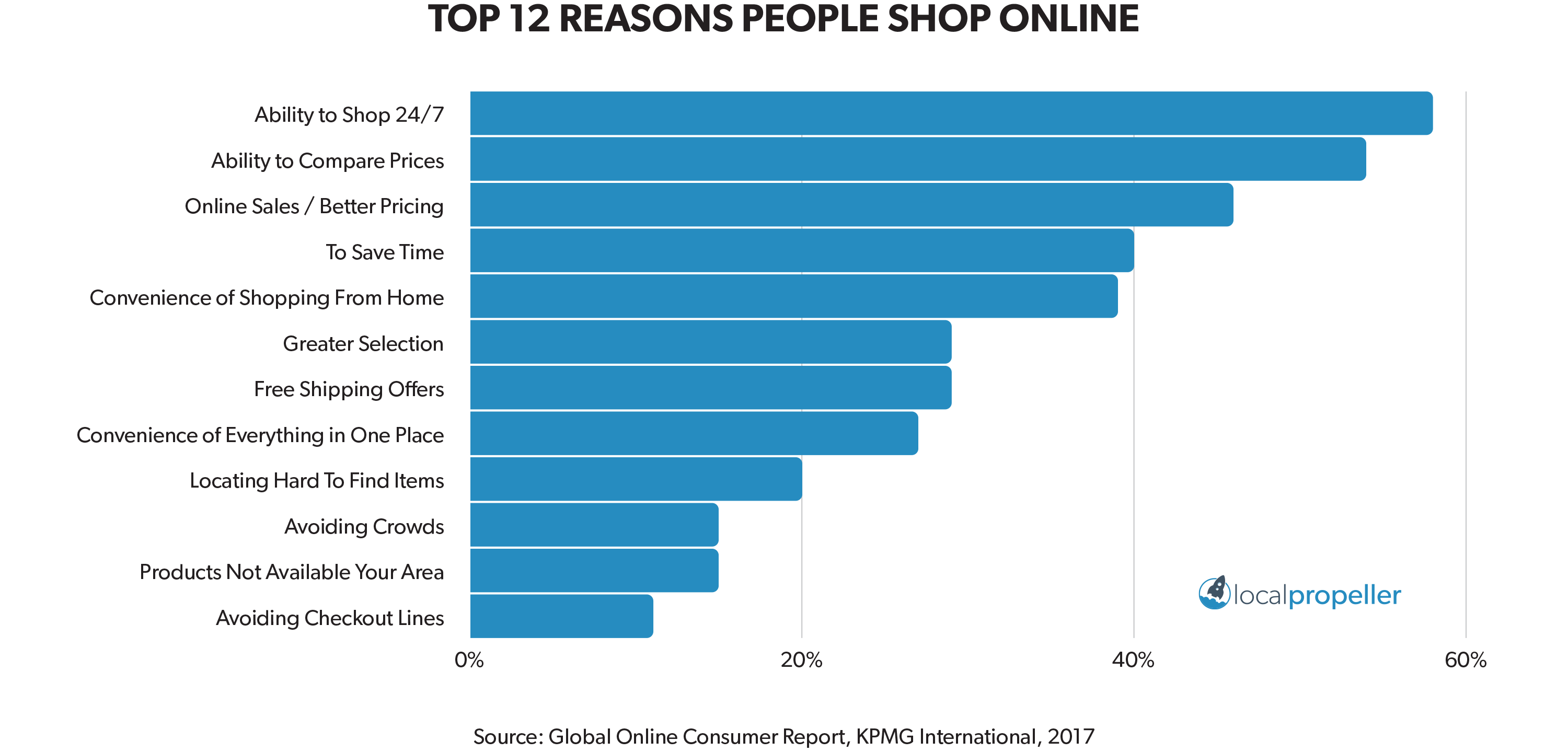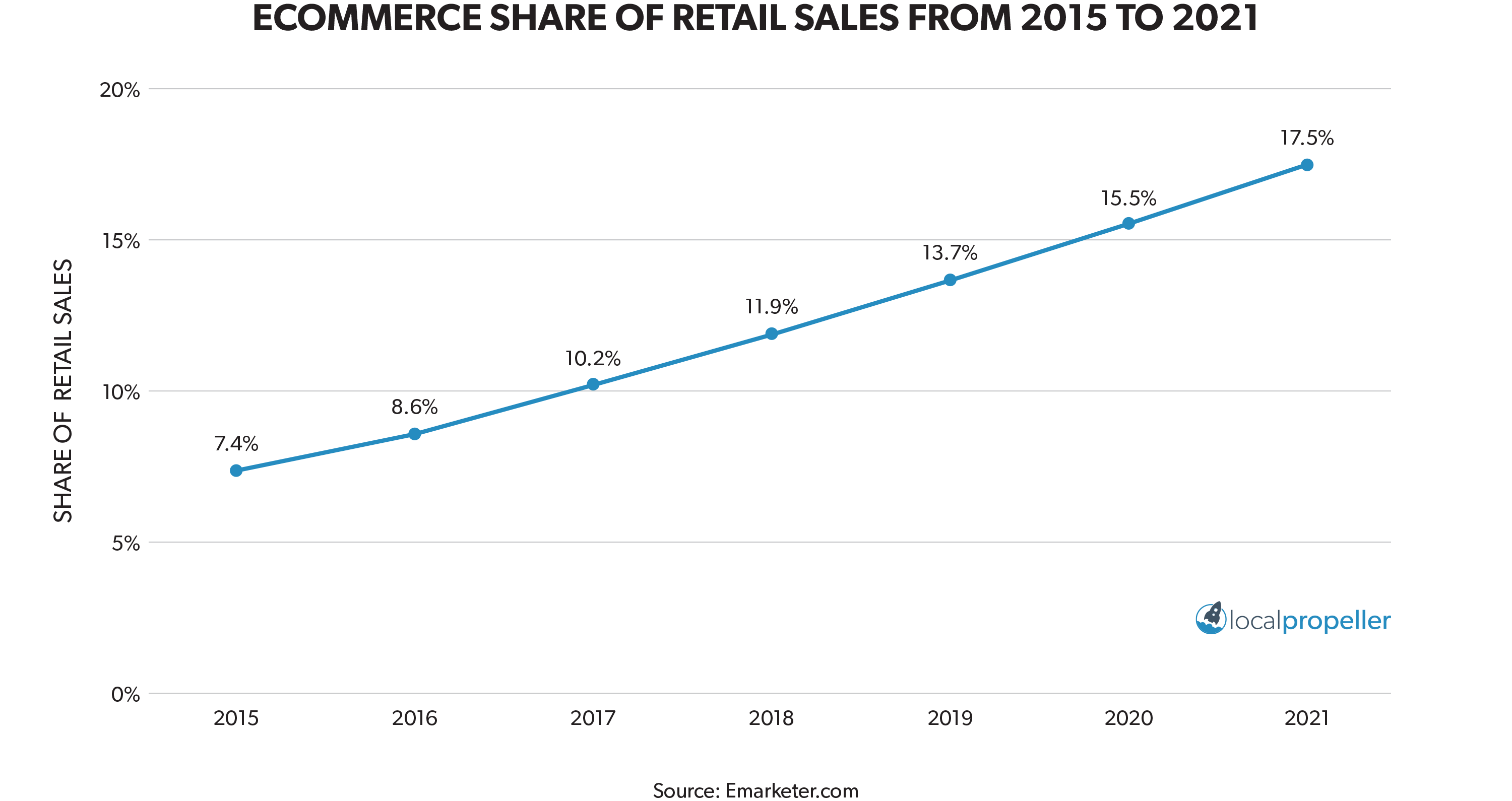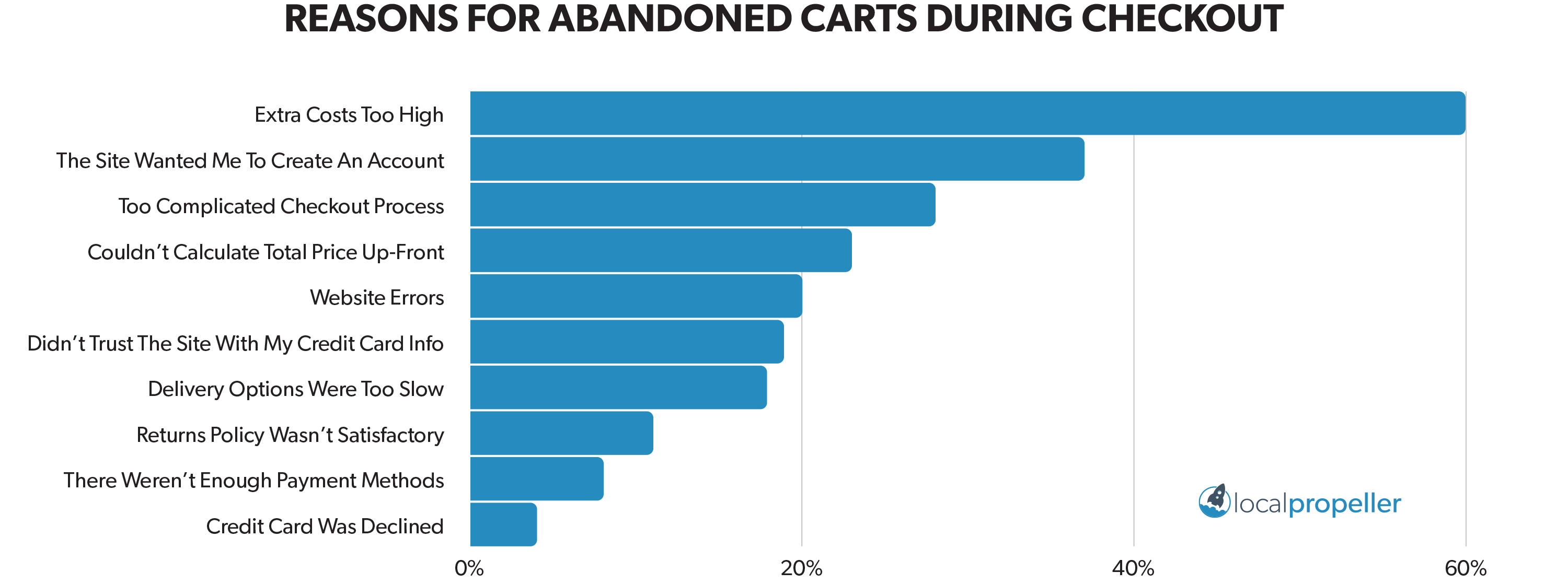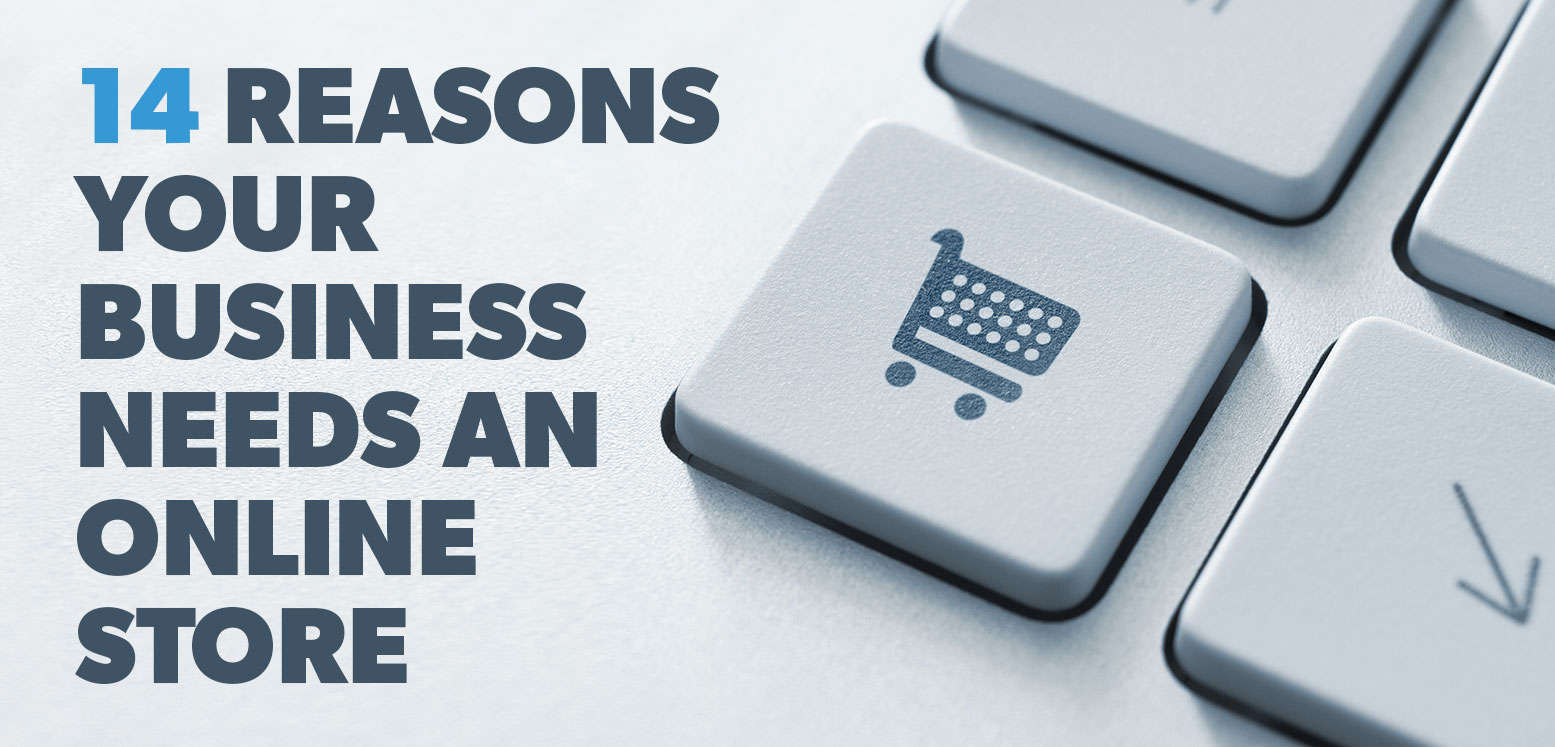eCommerce has been steadily on the rise since the early days of the internet. In 2015 7.4% of all retail sales were online. By 2021 the percentage of online sales is expected to increase to 17.5% – that’s an increase of 85.1% in just 6 years! And there’s no sign that the trend is slowing down.

The primary reason people are shopping online is that they’re able to shop 24 hours a day. The world no longer works on a 9 to 5 schedule and people demand convenience and selection above all else. If you have an online store ready to cater to these needs your business has a massive advantage over your competitors who are stuck in the brick and mortar past.

Top 14 Advantages of eCommerce
Here are the top reasons why more and more merchants are turning to eCommerce as a main source of revenue growth.
1. Super Fast To Market Time
Unlike a brick and mortar store, your eCommerce store can be up and running in just a few clicks if you’re looking for a basic eCommerce solution. Online platforms like Shopify and Squarespace use templates that simplify the creation of your store, plus they take care of hosting, security and maintenance. These platforms make it both simple and realistic for business owners to create attractive and reliable sites with minimal effort. You only require basic technical knowledge to have a professional website up and running in just an afternoon.
There are also experts (like us) who are able to build you a significantly more advanced eCommerce solution using these same platforms, using custom HTML coding and expert knowledge to create an eCommerce solution that can meet more of your business and client requirements.
2. Significantly Lower Startup Cost
Starting a store online allows you to avoid many of the large upfront investments that a traditional brick and mortar store requires. There is no rent, no renovations and no payroll. And if you’re selling products using drop shipping, there aren’t even inventory costs.
3. More and More Shoppers Start Online
Even if a customer ultimately ends up purchasing from a traditional store, more and more are starting the buying process online, using online searches to compare prices and brands, search customer reviews and check inventory levels.
The only way to ensure potential shoppers find your products is to have an online presence. Even if it’s just to check your hours and location, it’s vital that potential customers can easily find the information they are looking for.
4. Detailed Customer Data
One of the key advantages of eCommerce is how easy it is to collect, analyze and act on customer data. You can use tools like Google Analytics or Crazy Egg to analyze exactly how clients are finding your online store, what they are looking at and what actions they are taking while on your website in general – giving constant feedback and actionable insights. This information includes:
- What time of the day, week and month your website is most popular
- How people are finding your website (Google search, social media, PPC advertising, etc.)
- Where your website is most popular geographically
- The products and pages that are most popular
- The features of your website that are the most (and least) used
This allows you to fine tune both the products you sell and how you sell them to ensure that your store to give your customers the best possible customer experience, and as a result increases your profits.
5. Efficient PPC Marketing Spend
Relying on pay per click (PPC) digital advertising is typically far more cost effective than traditional print advertising. PPC advertising is built around efficiently targeting potential customers online, rather than relying on blanket advertising using flyers, mailers or placing an ad in a newspaper. You can target incredibly specific demographics (like location, income, education, interests, etc.) and serve targeted ads focused on those specific demographics. This gives you the most bang for your buck, but also ensures that the most likely customers are seeing your ads.
6. Email Marketing
Email marketing is the best friend of any eCommerce store. You can easily send both past and potential customers information about upcoming sales and new products for almost no cost. And you can send these messages around the world instantly.
Even more important are abandoned cart emails – one of the most effective ways an online store has to increase sales. On average, 69% of customers will abandon their carts for a multitude of reasons (including extra costs, difficulty of checkout, etc.). By sending these customers an email reminding them of the items left in their cart you’re significantly more likely to make that sale. Abandoned cart emails have an open rate of around 45%, compared to a typical email marketing message which has an open rate of around 16%.

7. Easily Reach New Customers
Unlike brick and mortar locations, an online store allows you to reach a worldwide audience. You can easily sell to customers who would never be able to purchase from your store otherwise. This literally opens up a world of possibilities.
8. Integration With Other Marketplaces
Online selling isn’t limited to your website, you can also integrate established marketplaces like Amazon, Etsy and eBay right into your online store. This allows you to reach the widest possible audience with the lowest possible cost of sales.
9. Drop Shipping
Drop shipping allows you to sell a wide range of products without having to maintain inventory of those products. When your customer places an order, a warehouse half way around the world is notified of the sale and ships the products directly to your customer. You can charge whatever you want for the products – you simply collect the money from your customer and pay for the drop shipper for the products. Using drop shipping you can easily sell hundreds or even thousands of incredibly unique and niche products on your website and your only expense is maintaining your website.
10. Serve Niche Markets
eCommerce allows you to service any niche market with a minimum of effort and expense. You’d be hard pressed to start a brick and mortar store that specializes in selling rare 1980’s British records, but you could easily start an online store for precisely that. You’d be able to reach billions of potential customers, instead the few that walk past your physical store on the street.
11. Low Overhead
Running an online store is massively cheaper than a traditional brick and mortar location. There are still costs of course, but these are focused almost exclusively on website maintenance and marketing. The typical expenses include:
- Domain name fees (yearly)
- Web hosting fees (monthly or yearly)
- PPC marketing
- Website development and maintenance (to keep your website running smoothly and securely)
- Graphic design, marketing strategy, SEO and copywriting
12. Open for Business 24 Hours a Day
Most online stores are totally automated, enabling customers to make a purchase whenever and wherever it suits them. The only interaction from the shop owner is typically when shipping a product after a purchase (and even this part can be automated, ask us how!)
13. You Can Sell Literally Anything Online!
You are not limited to selling physical products online – you can sell absolutely anything, including ebooks, online courses, services or even drop ship other people’s products. All you need is a way to accept payment for these products or services and you’re good to go. Plus if you’re selling digital goods you can automate the entire sales process, from payment to delivery with a bare minimum of input.
14. Content Marketing and SEO
A well built online store allows you to communicate detailed information about your products and services. By adding detailed product descriptions, product comparisons, inventory and pricing, you give customers a great deal of information that allows them to make an informed purchase. But this information is also amazing for SEO purposes, helping new customers find your store.
You can also use blog posts to provide useful content about the use of your products or services. Food companies, for example, can provide recipes and tips on how to use your products in new and innovative ways.
This type of useful content creates a story for your brand, creates brand loyalty and supplies a better customer experience. In the highly competitive eCommerce market, this type of information differentiates you from other sellers.
We Can Help You Get Started
Whether you’re looking to create a brand new online store, or upgrade your existing one, Local Propeller can help. We have decades of combined experience and have built countless online stores on a variety of platforms, including Shopify, WooCommerce, Squarespace, Magento and Easy Digital Downloads (EDD).
We don’t just build eCommerce websites and hand over the keys, we partner with our customers, offering analysis, expertise and advice to help you grow your sales and increase your ROI.
Check out our Free Website Review to analyze how our current website is performing.
If you want to learn more about how we can help you create an amazing online store contact us and one of our eCommerce experts will get back to you right away.




